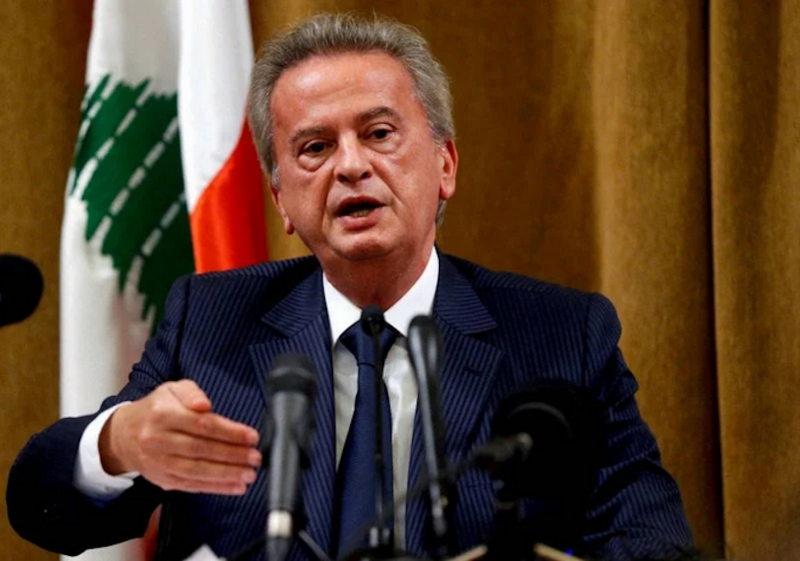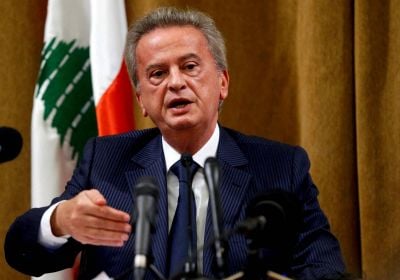
Central Bank Governor Riad Salameh. (Credit: Archive Reuters Mohammed Azakir)
From a distance, the scenario looks like bad vaudeville or caricature: The central bank governor of a bankrupt country flees justice, against a backdrop of disputes among several security services. Upon closer inspection, though, the picture is a nuanced embodiment of a typically Lebanese political battle – a melange of private and public interests, demagogy and one-upmanship.
Local media wondered Tuesday, ‘Where is Riad Salameh?’ On Wednesday State Security, acting at the request of the attorney general at the Mount Lebanon court of appeal Ghada Aoun, sought to apprehend the Bank of Lebanon (BDL) governor, who is also the object of several European investigations.
Aoun opened an investigation against him on suspicion of fraud in the period leading up to Lebanon’s 2019 financial collapse – accusations Salameh denies – and issued an open-ended summons against him.
This isn’t just another court case. On one hand, Riad Salameh has been one of the central figures of the Lebanese state for three decades (having been BDL governor since 1993), and as such the strongbox of the republic, supposed to know all the figures and all the secrets. On the other hand, Michel Aoun has had Salameh in his sights for years, particularly since 2019. The President of the Republic needs to restore his mandate and Salameh – seen to be close to what Aounists call the Hariri-Berri-Joumblatt troika, regarded to be corrupt – is the ideal scapegoat. However, Ghada Aoun and State Security chief Tony Saliba, himself implicated in the case of the double explosion in the port, are both known to be close to Baabda.
“Aoun is behind the cabal against Salameh with a very clear objective,” claimed a leading politician opposed to the presidential camp, “to control all the important posts before the end of his mandate.”
“The president has never interfered in the work of the judiciary,” averred one Baabda official.
“He cannot keep his job”
According to information obtained by L’Orient Le Jour, last September Aoun made his approval of Najib Mikati’s government conditional upon Salameh’s dismissal and the approval of several appointments in the judicial and security fields. Without closing the door, Mikati replied at that time that nothing could be decided before the formation of the government. He evaded the subject in the weeks before cabinet was paralyzed by the boycott of Shiite ministers wanting Tarek Bitar removed from the port explosion investigation. With the government back in office in January, the issue returned to the table.
“Riad Salameh’s time of grace is over,” Aoun said in an interview with the daily al-Jumhuriya in early February.
“In the eyes of the president, Salame cannot keep his position,” said a source close to the presidency who wished to remain anonymous. “He must be arrested or resign and leave the country.”
Mikati refuses, for the moment, to give in. At the end of December, the prime minister said he had no intention of considering the possible dismissal of the BDL governor, arguing that “you don’t change officers during a war.” More recently, he was accused of interfering in the justice system – a claim he half denied – by asking prosecutor general Ghassan Oueidat to prevent the search of several banks, part of magistrate Jean Tannous’ investigation of Salameh for “embezzlement at the expense of the Bank of Lebanon” and “aggravated money laundering.” This case, linked to those being conducted in Europe, has nothing to do with the one led by Judge Ghada Aoun.
Aoun isolated
When State Security arrived at his Rabieh residence Tuesday, Salameh was indeed present, a security source confirmed to L’Orient-Le Jour, but the internal security forces men guarding his house prevented State Security from acting. The incident took on another sectarian and political dimension as the ISF unit was led by General Imad Othman, who is close to former Prime Minister Saad Hariri. Interior Minister Bassam Maoulaoui and State Security denied reports of a clash between the two security forces, but this is not enough to calm political tensions. On one hand, the president is furious about the ISF intervention. On the other hand, the Future Movement, whose leader recently withdrew from politics, accuses the president of having ordered the BDL governor’s arrest for partisan reasons.
The drama resumed with a vengeance Wednesday. Ghada Aoun filed a lawsuit against the ISF’s Othman for having obstructed the execution of the warrant against Salameh. For its part, the Future Movement denounced this “heresy”, sating that attacking “the leadership of the ISF in this crude way is unacceptable. In Hariri’s absence, it is his aunt Bahia who takes the lead by contacting Mikati. According to the Future Movement, the Prime Minister described Judge Aoun’s complaint as “defamatory” and promised to follow-up on the case “personally." In this case, President Aoun is rather isolated. Saad Hariri, Parliament Speaker Berri and PSP leader Joumblatt oppose Salameh’s dismissal. “They will not allow Aoun to take over the key posts of the state,” said a source close to Berri. Without openly supporting Salameh, the Lebanese Forces also criticized Aoun’s action, which “is attacking the head of the ISF because he refuses to become a tool for political settlement.”
“Salameh must be accountable”
For his part, an embarrassed Mikati has yet to make any official statement. “He does not want to be involved in this,” said one of his advisers.
“Mikati knows that he can no longer protect Salameh, knowing that the French no longer support him,” said a close friend of president.
Paris seems to have distanced itself from the BDL governor, and would prefer that he be replaced. The United States’ position is different. While they are not attached to Salameh personally, they fear that ousting him would make BDL first deputy governor Wassim Mansouri (who is Shiite) de facto governor. The position of Hezbollah, the FPM’s only ally, seems more ambiguous.
“Salameh must be held accountable,” said a senior party official, while offering assurances that the party does not wish to interfere in this matter. Hezbollah must take into account the Amal Movement’s “attachment” to the BDL governor.
The escalation against the governor comes a few days after Hassan Nasrallah’s remarks criticizing the Lebanese army. Among President Aoun’s main opponents there is a link between these two events, believing that the FPM-Hezbollah have orchestrated a campaign to weaken some key state actors in order to replace them with their allies. FPM head, the president’s son-in-law Gebran Bassil, claimed Thursday that his camp does not seek to replace the BDL governor with one of its own. In an interview with CNN, Ghada Aoun promised that she would “continue” her investigation against the Salameh. According to information obtained by Reuters, and confirmed by L’Orient-Le Jour, the central bank governor is currently staying in an apartment in the central bank building.
